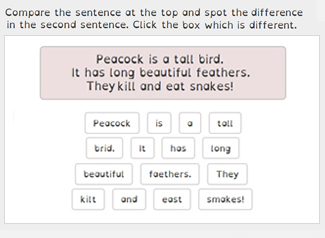Proofreading
Proofreading is an activity that requires a high level of concentration. This activity demands the child to remain focused for a length of time. The child learns a lot about grammar and spelling. Proofreading is a difficult task for even highly focused people. They tend to overlook the mistakes.
In this activity, proof reading is presented as a game. A passage is shown. Beneath this, the same passage is shown with five mistakes. The challenge is to spot the five errors. The task of finding a specific number of mistakes makes the activity interesting for children and it engages their attention.
How is this activity organized?
In this activity, a passage containing two or three sentences is given. The same material is given again but this second passage has five mistakes. Children have to spot these five mistakes.
There are five levels.The complexity of the sentences goes up as the child moves through the levels.
Benefits of proofreading activity:
- Helps children with attention disorder: Some children have attention disorder. They cannot remain at one place for some time. They are restless. They cannot concentrate on an activity for more than few minutes. They are not organized enough to complete tasks.
Children learn better when they enjoy learning. This activity, presented in the form of a game, makes the child focus. This game also improves their attention span. Just spending five minutes a day in this type of activity would greatly benefit the child.
- Improves attention to detail. Some children don’t concentrate enough. They are always in a hurry to somehow finish the task and in that process they overlook some vital parts of the task. Proofreading requires high observational skill and attention to details. One quality of students, who do well in their studies, is their ability to pay attention even to small details. These children have good observation skills and they are able to easily recall what is learnt.
This is a good activity to train the brain to focus and to look for details. Regular practice is required.
- Improves spelling: Proofreading makes the child pay attention to every letter in words. This is a good activity to improve spelling. The child trains the brain to process all the information. The child can read aloud or use fingers as a guide to read. Proofreading requires the child to read slowly, concentrating on each letter. The child becomes aware of spelling patterns. This activity of self-correction helps children to understand where they go wrong. For struggling readers, regular practice is required.
The challenge is to spot all the five mistakes. Is your child able to spot the mistakes? Children with poor attention may not observe the s in ‘evenings’. They may not observe the difference in rise and rice as both words have the same pronunciation. Find out the areas of difficulties of your child.
Tips for you, the parents:
- Usefulness of self-correction:
It is better to use a board to teach your child. Ask the child to copy from the board. Is your child able to copy from the board without making any mistakes? Does she/he take too much time? Does the child miss lines while copying? Take corrective action wherever required.
One method to correct the copying errors is to make your child copy a passage from board or from a book. Then ask the child to correct any mistakes. Self-correction is a good remedial action for those who struggle with spelling.
Studies have shown that self-correction is better than traditional methods in improving spelling of children with learning difficulties. You can access research reports from the net. Proofreading is a good strategy to improve spelling.
Also search: Spelling strategies for struggling spellers.
- Proofreading is a good remedial activity:
Self-correction is correcting what one has written whereas proofreading is correcting one’s mistakes or mistakes made by others. You can write passages from the child’s text and ask your child to spot the mistakes. Daily practice is recommended.
The Department of Special Education of The Pennsylvania State University conducted a study on the usefulness of proofreading in improving the spelling of children with difficulties in spelling. The study showed that the activity of proofreading helped difficult spellers to improve their spelling.
Make children refer often to a good dictionary.
Learn more about spelling strategies. The internet has many resources.

